2023
|
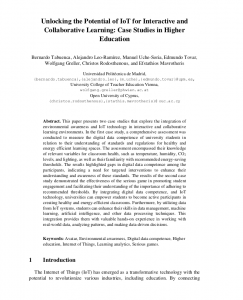 | BernardoTabuenca,; Leo-Ramirez, Alejandro; Uche-Soria, Manuel; Tovar, Edmundo; Greller, Wolfgang; Rodosthenous, Christos; Mavrotheris, Efstathios Unlocking the Potential of IoT for Interactive and Collaborative Learning: Case Studies in Higher Education Proceedings 2023, ISBN: 978-3-031-53022-7. @proceedings{icl2023,
title = {Unlocking the Potential of IoT for Interactive and Collaborative Learning: Case Studies in Higher Education},
author = {BernardoTabuenca and Alejandro Leo-Ramirez and Manuel Uche-Soria and Edmundo Tovar and Wolfgang Greller and Christos Rodosthenous and Efstathios Mavrotheris},
editor = { Michael E. Auer and Uriel R. Cukierman and Eduardo Vendrell Vidal and Edmundo Tovar Caro},
url = {https://www.christosrodosthenous.info/wp-content/uploads/2023/10/1252.pdf},
doi = {10.1007/978-3-031-53022-7_43},
isbn = {978-3-031-53022-7},
year = {2023},
date = {2023-09-29},
urldate = {2023-09-29},
booktitle = {Proceedings of the 26th International Conference on Interactive Collaborative Learning},
abstract = {This paper presents two case studies that explore the integration of environmental awareness and IoT technology in interactive and collaborative learning environments. In the first case study, a comprehensive assessment was conducted to measure the digital data competence of university students in relation to their understanding of standards and regulations for healthy and energy efficient learning spaces. The assessment encompassed their knowledge of relevant variables for classroom health, such as temperature, humidity, CO2 levels, and lighting, as well as their familiarity with recommended energy-saving thresholds. The results highlighted gaps in digital data competence among the participants, indicating a need for targeted interventions to enhance their understanding and awareness of these standards. The results of the second case study demonstrated the effectiveness of the serious game in promoting student engagement and facilitating their understanding of the importance of adhering to recommended thresholds. By integrating digital data competence, and IoT technology, universities can empower students to become active participants in creating healthy and energy-efficient classrooms. Furthermore, by utilizing data from IoT systems, students can enhance their skills in data management, machine learning, artificial intelligence, and other data processing techniques. This integration provides them with valuable hands-on experience in working with real-world data, analyzing patterns, and making data-driven decisions.},
keywords = {e-learning, Environmental Education},
pubstate = {published},
tppubtype = {proceedings}
}
This paper presents two case studies that explore the integration of environmental awareness and IoT technology in interactive and collaborative learning environments. In the first case study, a comprehensive assessment was conducted to measure the digital data competence of university students in relation to their understanding of standards and regulations for healthy and energy efficient learning spaces. The assessment encompassed their knowledge of relevant variables for classroom health, such as temperature, humidity, CO2 levels, and lighting, as well as their familiarity with recommended energy-saving thresholds. The results highlighted gaps in digital data competence among the participants, indicating a need for targeted interventions to enhance their understanding and awareness of these standards. The results of the second case study demonstrated the effectiveness of the serious game in promoting student engagement and facilitating their understanding of the importance of adhering to recommended thresholds. By integrating digital data competence, and IoT technology, universities can empower students to become active participants in creating healthy and energy-efficient classrooms. Furthermore, by utilizing data from IoT systems, students can enhance their skills in data management, machine learning, artificial intelligence, and other data processing techniques. This integration provides them with valuable hands-on experience in working with real-world data, analyzing patterns, and making data-driven decisions. |
2020
|
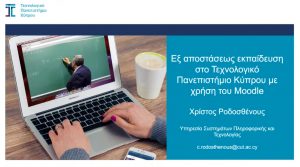 | Rodosthenous, Christos Εξ Αποστάσεως Εκπαίδευση στο Τεχνολογικό Πανεπιστήμιο Κύπρου με Χρήση του Moodle Presentation 07.11.2020. @misc{rodosthenous2020.moodle,
title = {Εξ Αποστάσεως Εκπαίδευση στο Τεχνολογικό Πανεπιστήμιο Κύπρου με Χρήση του Moodle},
author = {Christos Rodosthenous},
url = {https://youtu.be/EoRqHMFUMZE?t=17025
https://pretalx.ellak.gr/moodlemoot2020/talk/XWVWUS/},
year = {2020},
date = {2020-11-07},
booktitle = {MoodleMoot 2020},
keywords = {distance education, e-learning, eLearning Platform},
pubstate = {published},
tppubtype = {presentation}
}
|
2016
|
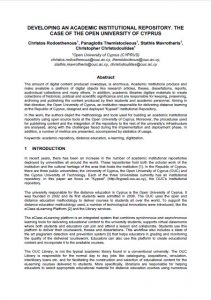 | Rodosthenous, Christos; Themistocleous, Panagiotis; Mavrotheris, Stathis; Christodoulides, Christopher Developing An Academic Institutional Repository. The Case Of The Open University Of Cyprus Proceedings Article In: Proceedings of the 8th International Conference on Education and New Learning Technologies (EDULEARN2016), pp. 1175-1183, IATED, Barcelona, Spain, 2016, ISSN: 2340-1117. @inproceedings{Rodosthenous2016c,
title = {Developing An Academic Institutional Repository. The Case Of The Open University Of Cyprus},
author = {Christos Rodosthenous and Panagiotis Themistocleous and Stathis Mavrotheris and Christopher Christodoulides},
url = {https://www.christosrodosthenous.info/wp-content/uploads/2018/02/DEVELOPING_AN_ACADEMIC_INSTITUTIONAL_REPOSITORY-preprint.pdf},
doi = {10.21125/edulearn.2016.1243},
issn = {2340-1117},
year = {2016},
date = {2016-07-01},
booktitle = {Proceedings of the 8th International Conference on Education and New Learning Technologies (EDULEARN2016)},
pages = {1175-1183},
publisher = {IATED},
address = {Barcelona, Spain},
series = {8th International Conference on Education and New Learning Technologies},
abstract = {The amount of digital content produced nowadays, is enormous. Academic institutions produce and make available a plethora of digital objects like research articles, thesis, dissertations, reports, audiovisual collections and many others. In addition, academic libraries digitize materials to create collections of historical, political or scientific significance and are responsible for keeping, preserving, archiving and publishing the content produced by their students and academic personnel. Aiming in that direction, the Open University of Cyprus, an institution responsible for delivering distance learning at the Republic of Cyprus, designed and deployed “Kypseli” Institutional repository.
In this work, the authors depict the methodology and tools used for building an academic Institutional repository using opensource tools at the Open University of Cyprus. Moreover, the procedures used for publishing content and the integration of the repository to the rest of the University’s infrastructure are analyzed, along with the challenges faced during the implementation and deployment phase.In addition, a number of metrics are presented, accompanied by statistics of usage.},
keywords = {academic repository, digitization, distance education, e-learning},
pubstate = {published},
tppubtype = {inproceedings}
}
The amount of digital content produced nowadays, is enormous. Academic institutions produce and make available a plethora of digital objects like research articles, thesis, dissertations, reports, audiovisual collections and many others. In addition, academic libraries digitize materials to create collections of historical, political or scientific significance and are responsible for keeping, preserving, archiving and publishing the content produced by their students and academic personnel. Aiming in that direction, the Open University of Cyprus, an institution responsible for delivering distance learning at the Republic of Cyprus, designed and deployed “Kypseli” Institutional repository.
In this work, the authors depict the methodology and tools used for building an academic Institutional repository using opensource tools at the Open University of Cyprus. Moreover, the procedures used for publishing content and the integration of the repository to the rest of the University’s infrastructure are analyzed, along with the challenges faced during the implementation and deployment phase.In addition, a number of metrics are presented, accompanied by statistics of usage. |
2015
|
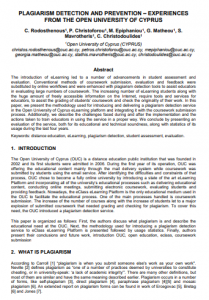 | Rodosthenous, Christos; Christoforou, Petros; Epiphaniou, Michalis; Matheou, Georgia; Mavrotheris, Stathis; Christodoulides, Christopher Plagiarism Detection and Prevention – Experiences From the Open University of Cyprus Proceedings Article In: Proceedings of the 7th International Conference on Education and New Learning Technologies (EDULEARN15), pp. 1348–1355, IATED, 2015, ISSN: 2340-1117. @inproceedings{RODOSTHENOUS2015PLA,
title = {Plagiarism Detection and Prevention – Experiences From the Open University of Cyprus},
author = {Christos Rodosthenous and Petros Christoforou and Michalis Epiphaniou and Georgia Matheou and Stathis Mavrotheris and Christopher Christodoulides},
url = {https://library.iated.org/view/RODOSTHENOUS2015PLA
https://www.christosrodosthenous.info/wp-content/uploads/2018/02/PLAGIARISM-DETECTION-AND-PREVENTION.pdf},
issn = {2340-1117},
year = {2015},
date = {2015-01-01},
booktitle = {Proceedings of the 7th International Conference on Education and New Learning Technologies (EDULEARN15)},
pages = {1348--1355},
publisher = {IATED},
series = {7th International Conference on Education and New Learning Technologies},
abstract = {The introduction of eLearning led to a number of advancements in student assessment and evaluation. Conventional methods of assignment submission, evaluation and feedback were substituted by online workflows and were enhanced with plagiarism detection tools to assist tutors in evaluating large numbers of assignments. The increasing number of eLearning students along with the huge amount of freely accessible information on the Internet, require tools and services for tutors, to assist the grading of student assignments and check the originality of their work. In this paper, we present the methodology used for introducing and delivering a plagiarism detection service in the Open University of Cyprus eLearning platform and integrating it with the assignment submission process. Additionally, we describe the challenges faced during and after the implementation and the actions taken to train tutors in using the service in a proper way. We conclude by presenting an evaluation of the service, both for its educational and technical soundness, along with statistics of its usage during the last four years.},
keywords = {distance education, e-learning, evaluation, plagiarism detection, student assessment},
pubstate = {published},
tppubtype = {inproceedings}
}
The introduction of eLearning led to a number of advancements in student assessment and evaluation. Conventional methods of assignment submission, evaluation and feedback were substituted by online workflows and were enhanced with plagiarism detection tools to assist tutors in evaluating large numbers of assignments. The increasing number of eLearning students along with the huge amount of freely accessible information on the Internet, require tools and services for tutors, to assist the grading of student assignments and check the originality of their work. In this paper, we present the methodology used for introducing and delivering a plagiarism detection service in the Open University of Cyprus eLearning platform and integrating it with the assignment submission process. Additionally, we describe the challenges faced during and after the implementation and the actions taken to train tutors in using the service in a proper way. We conclude by presenting an evaluation of the service, both for its educational and technical soundness, along with statistics of its usage during the last four years. |
2010
|
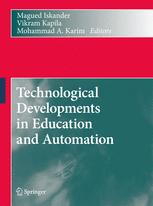 | Rodosthenous, Christos; Kameas, Achilleas; Pintelas, Panagiotis Diplek: an open educational Platform that supports the composition of learning, management and communication services Book Chapter In: Iskander, Magued; Kapila, Vikram; Karim, Mohammad A (Ed.): Technological Developments in Education and Automation, pp. 321–326, Springer Netherlands, Dordrecht, 2010, ISBN: 978-90-481-3656-8. @inbook{Rodosthenous2010,
title = {Diplek: an open educational Platform that supports the composition of learning, management and communication services},
author = {Christos Rodosthenous and Achilleas Kameas and Panagiotis Pintelas},
editor = {Magued Iskander and Vikram Kapila and Mohammad A Karim},
url = {https://www.christosrodosthenous.info/wp-content/uploads/2018/02/DIPLEK-submitted.pdf
www.springerlink.com/content/m2g8j67572w512v7},
doi = {10.1007/978-90-481-3656-8_59},
isbn = {978-90-481-3656-8},
year = {2010},
date = {2010-01-01},
booktitle = {Technological Developments in Education and Automation},
pages = {321--326},
publisher = {Springer Netherlands},
address = {Dordrecht},
abstract = {This paper presents Diplek, a Learning Management System (LMS) that addresses the needs of novice users, educators and students. The development of Diplek is based on a service oriented architecture. Among the many services offered by the platform, one can distinguish the innovative Video recording service and the Course creation service that enable instructors to import any type of Learning Object and associate it with metadata. Diplek offers a friendly user interface with dialogs and wizards that help users deal with difficult and time consuming tasks. The platforms architecture (not web-based) enables it to be deployed in both internet and internet-less communities.},
keywords = {distance education, e-learning, eLearning Platform},
pubstate = {published},
tppubtype = {inbook}
}
This paper presents Diplek, a Learning Management System (LMS) that addresses the needs of novice users, educators and students. The development of Diplek is based on a service oriented architecture. Among the many services offered by the platform, one can distinguish the innovative Video recording service and the Course creation service that enable instructors to import any type of Learning Object and associate it with metadata. Diplek offers a friendly user interface with dialogs and wizards that help users deal with difficult and time consuming tasks. The platforms architecture (not web-based) enables it to be deployed in both internet and internet-less communities. |





